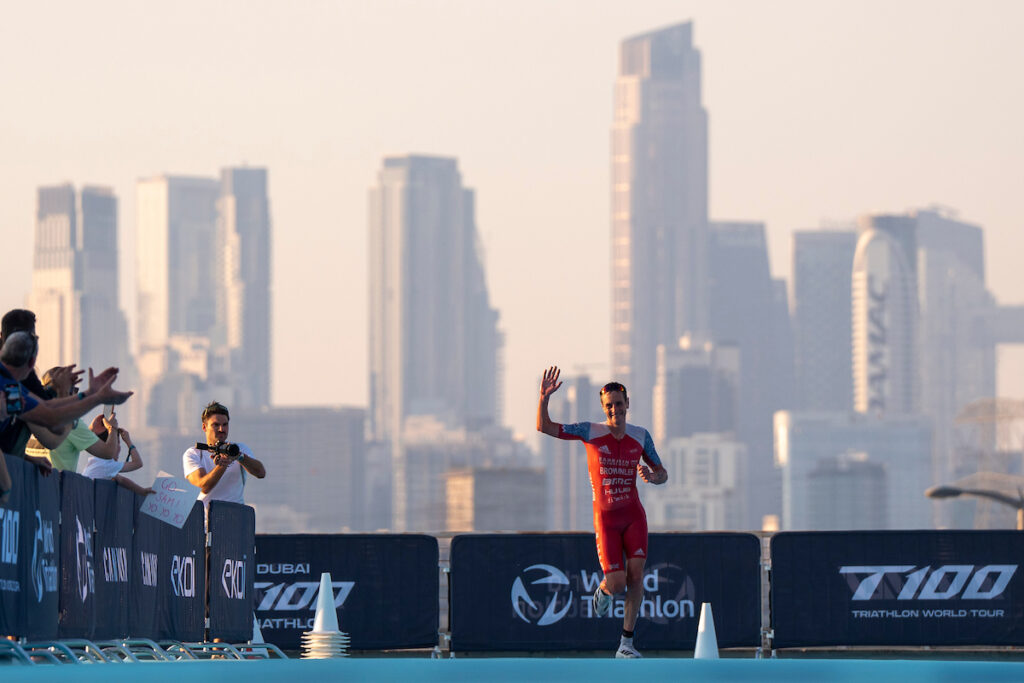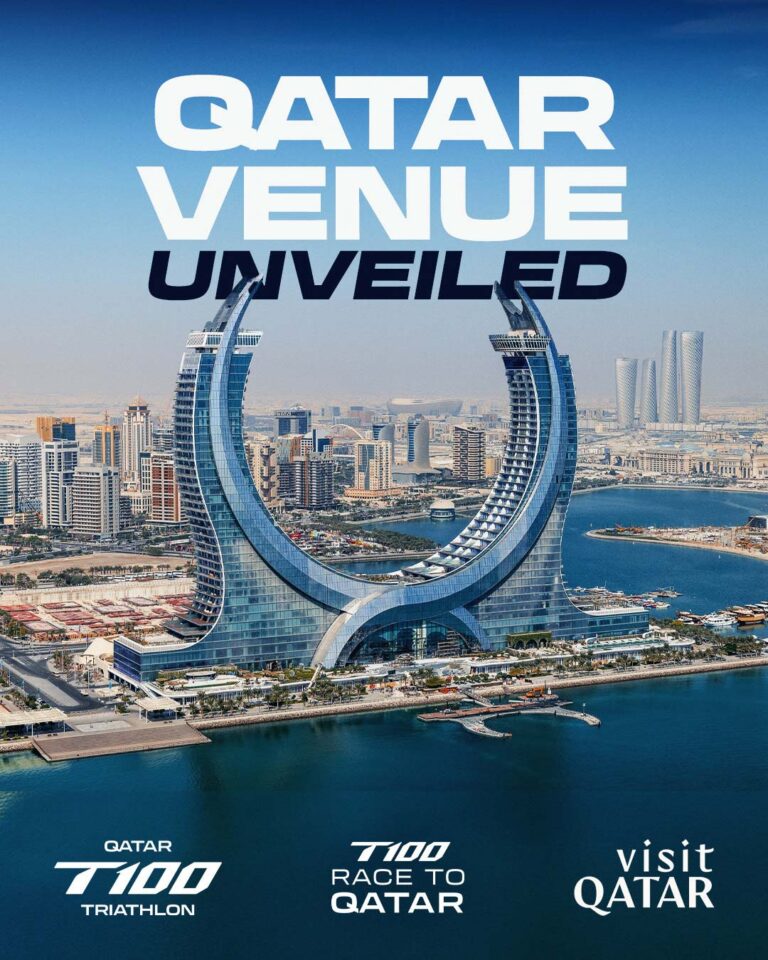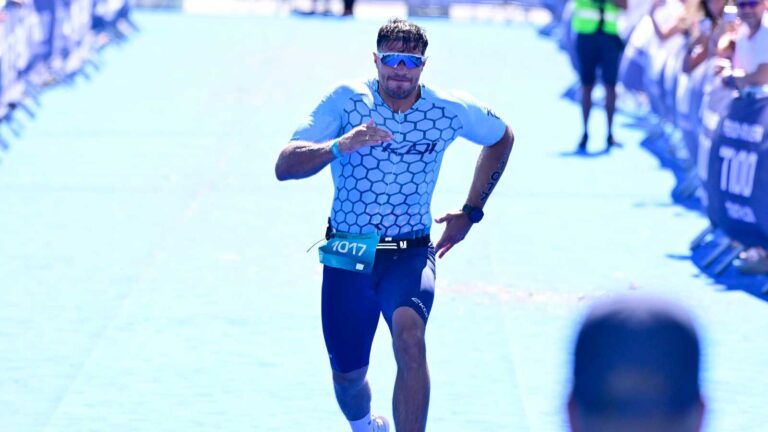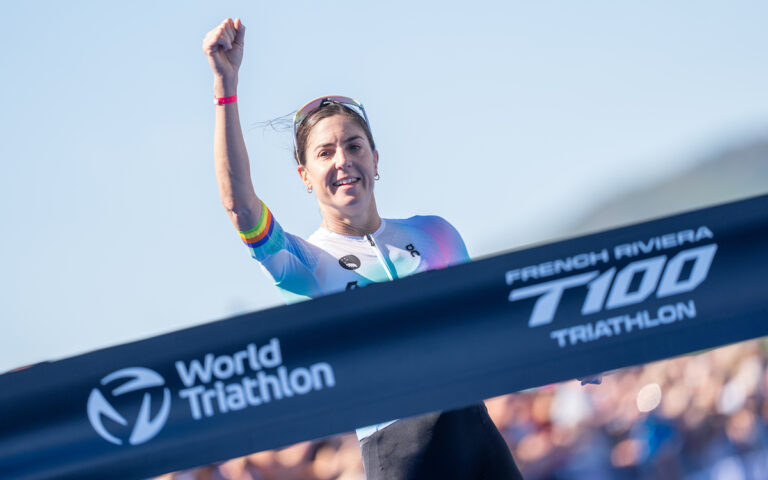London, UK: British double Olympic champion Alistair Brownlee has announced this morning his retirement from professional triathlon, following his podium finish at the Dubai T100 Triathlon World Championship Final on Sunday.
Speaking exclusively to the Professional Triathletes Organisation (PTO) in Dubai before he flew home to Yorkshire, the 36-year-old revealed that ‘winning two Olympic gold medals….especially that race in London’ were the undoubted highlights of an 18-year career. But that he is now conscious he is ‘putting the miles on the clock and wearing things down’ and still wants to stay fit and be active for other challenges so ‘ultimately, it just feels really right’ to announce his retirement now.
The interview can be found here with the full transcript below.
PTO CEO Sam Renouf acknowledged Brownlee’s unprecedented contribution to the sport by saying:
“For me, Alistair must rank as one of the world’s very best, if not the best, professional triathlete. Not only for his phenomenal successes in the sport but also how he changed the sport – through the way he raced, the way he trained and the way he has dedicated his life to triathlon. He has also been an influential figure in the early days of the Professional Triathletes Organisation as an Athlete Board Member and I was extremely honoured that we were able to have him competing across all seven races of our inaugural T100 Triathlon World Tour with a podium placing in Dubai as his final professional event.”
Brownlee leaves the sport with an astonishing list of accomplishments. Outside of those two spectacular Olympic Gold medals in 2012 and 2016, he won Commonwealth Gold in 2014 and is also a four-time World Triathlon Champion – including winning junior, under 23 and two senior titles. He has also notched up five European Championship titles – once as a junior. In World Triathlon racing, the Yorkshireman earned 38 wins and 54 podiums from his 90 starts. He also found success in long-course, taking second at the Ironman 70.3 World Championships in 2018 and 2019 and now bows out in style after a third at the first-ever T100 Triathlon World Championship Final.
During 2024, Brownlee has competed in the inaugural season of the T100 Triathlon World Tour, a new 7-leg season of 100km triathlon (2km swim, 80km bike and 18km run) races featuring the world’s top 20 male and top 20 female triathletes racing head-to-head on a live global broadcast beamed to 195+ markets around the globe.
Starting in Miami (9 March), it touched down in Singapore (13-14 April), San Francisco (8-9 June), London (27-28 July), Ibiza (28-29 September), Lake Las Vegas (19-20 October) and then Dubai at the weekend (16-17 November) for the T100 Triathlon World Championship Final. Designated by the sport’s international governing body, World Triathlon, as the ‘official World Championship for long distance triathlon’, Brownlee came third in Dubai to register his first podium of the season and finished fifth in the overall T100 standings.
The 2024 T100 World Championship crowns went to Belgium’s Marten Van Riel and America’s Taylor Knibb. The 2025 T100 Triathlon World Tour season will start in Singapore at the beginning of April, with six other legs already confirmed in France, San Francisco, London, Ibiza, Lake Las Vegas and Dubai – and an ambition from the PTO to add more in the coming months.
Tell us about your retirement Alistair?
Alistair Brownlee (AB): Most people have been saying, are you all right? And I’m like, yeah, it’s great. I’m really happy with the decision.
How does it feel to have the T100 Triathlon World Championship Final in Dubai be the last race of a phenomenal career in this sport?
AB: I feel like I’ve been around the block a bit in triathlon. I’m now 36. I have basically been a professional athlete since I was 18, so it’s a long time. Over those years, triathlon was very literally a childhood dream for me to be a professional athlete. And I definitely achieved way, way beyond anything I could imagine.
So, I feel like I’ve done alright. And racing in T100 this year has probably been more about the racing per se. I mean, I am a competitor. I want to be on the start line and compete to the best of my ability. And so it’s been great to have a good result here in Dubai. But I also really believe in the importance – without sounding too high minded – of what T100 and the PTO are trying to do. Taking triathlon to those new audiences, to really engage fans and, most importantly, new fans of the sport. To raise athlete’s profiles, to give them the opportunity to race on the biggest stage and motivate and inspire a new generation of athletes into endurance sport. So it’s been fantastic to race this year in the T100.
I was pretty confident all year that this was going to be my last year racing, but I wanted to get to the end of the year and really see how I felt without making a rash decision. So it’s been special.
What made that decision for you?
AB: It’s many factors that have gone into that decision. Ultimately, it just feels really right. I know it is a kind of a wishy washy kind of thing to say, but it does and I’m really happy with it.
It’s a combination of…I have been doing it for a long time and there’s so many other things in sport I want to be able to do. I want to be able to do all kinds of endurance challenges. I want to stay fit and healthy and be part of sport, hopefully into my old age. And I’m definitely aware, you know, putting the miles on the clock and wearing things down. So I want to retire fit and healthy and not be forced to retire by injury and illness or whatever.
It has got more difficult for me. I can’t do anywhere near the training that I used to be able to do. So I also found it hard at times being on the start line, knowing that I’m not prepared to the level that I’d like to be. And I’m older. I’m 36. I’ve done it for a long time and there’s a lot of other things I want to do with my life.
And when you look back on your career, what are the highlights that stand out?
AB: That’s obviously an easy one. Winning two Olympic gold medals are the highlights. Especially that race in London. I’ve used this anecdote many times, but I was in school when London won that bid and it was seven years before the Olympic Games. And so that was a massive part of my life. And then to pull it off on that day was phenomenal. And then to do it again in Rio as well. But I think, as well, you know, the success and racing so many times over all those years. I actually did think of trying to look into it and see how many top level races I’ve done over all those years. But I haven’t done it yet.
How do you want to be remembered in this sport? And how do you think you’re perceived in this sport by your competitors?
AB: I guess that’s a question for other people to answer. I mean, I’m not really that person that, you know, not trying, I guess, to worry about the narrative too much of what other people think. And I just try to do what’s right. And so, yeah, I’d like to be remembered as someone who obviously won lots of races and was competitive.
I’d like my legacy to be much bigger than that. And that’s one of the many things that I want to work on. When I’ve got more time not trying to race. And the charity, the Foundation [Brownlee Foundation] is a big part of that. I really believe in the importance of sport in everyone’s life. It was absolutely crucial to my life. I believe young children need to discover if they have a passion for it. As early as possible and then be engaged in sport. And I think triathlon is an amazing vessel to engage people across the three sports. And that’s very much what we try and do with the Foundation. And I’d like to do a lot more of that in the future.
I know a little bit about the [Brownlee] Foundation and the impact that it’s having on such a cross-section of people. Can you tell me a little bit about that and also what you get from that?
AB: I’m very proud of the impact that the Brownlee Foundation has had now over ten years. It’s something that I want to continue to work on and grow over the next ten years with a bit more time and energy to do it.
I recommend everyone go to an event and volunteer if you can because they’re just incredibly inspiring days. I’m seeing young people who haven’t experienced sport in that way before. It can be fun. It can be inclusive. It can be competitive, but it doesn’t have to be. It can be about participation. There’s hundreds of examples we’ve got of school classes coming together to share maybe one of their slowest friends and across the line. And one of the examples, we’ve got people and teachers coming back and saying, ‘you know, so-and-so did it for the first time last year and now he’s back and he’s joined a triathlon club or swimming club or whatever, and he’s inspired on that day’. So, yeah, we get an awful lot of satisfaction from that.
Thinking of this year, do you not think that you could still compete for wins in the T100 series in 2025?
AB: I think I probably could compete for wins in the T100. But there’s so many factors now out of my control. I probably can’t beat the very top guys on that day. Someone like Martin [Van Riel], who’d have to have a bad day for me to win. And most frustratingly, the thing that I found the hardest competing now is I built a career on the ethos that I was the best prepared I possibly could be on the start line and I basically I can’t do that.
The training intensity I’ve done, you know, I still train hard and love it and enjoy it, but I can only do a fraction, basically, of the training I used to be able to do. And that means just standing on the start line thinking, ‘Yeah, I’m kind of here and you know, obviously I’m going to race as hard as I can and push and try and beat people, but I just don’t have the engine and the tools to actually win races in that way’.
And the unpredictability. This year, just kind of random injuries. You know, my body obviously is way more prone to injuries now, the illnesses like having problems with just being ill, kind of fatigue kind of stuff. I’ve never had illnesses like that in my whole career. So, yeah, and I don’t want to spend months of my life focusing and training hard and then for something to go wrong in the five days before a race. That unpredictability is something I found very tough.
What this what does this podium in Dubai mean to you personally?
AB: The podium in Dubai is very special. Obviously there’s been lots of frustrating…it’s been a frustrating year. With all kinds of reasons and so to get a podium here in my last race is obviously very special.
Was it always important for you to go out still on top and competing?
AB: I never really gave too much thought about how I wanted to go out. And if you asked me this question ten years ago, I would say I’m definitely not the kind of person who would race till I was 36. I’ll compete well and then love to retire and move on and do something completely different. But here I am ten years later and at some point in those years, my mind frame shifted too. Yeah, don’t worry too much about being on top and being super competitive in what you’re doing, actually, if you do it because you still want to get out of bed every morning and go and train hard and compete and you enjoy doing it, you take a lot of satisfaction from doing that. That’s what you should do, whether you’re competitive or not. And that’s ultimately why I’m still here. So, yeah, I guess the answer to that question is I never gave it too much thought of it like that. But yeah, ultimately I am still competing because I love it otherwise I would have retired a long time ago.
Was it important to you to be a part of the T100 inaugural year and, as you say, be a part of this next chapter in the long book of triathlon that you’ve featured in?
AB: As I’ve said, you know, I’m a big believer in Project T100. It’s fantastic and I’m honoured that I’ve been part of this first year. I guess it was important to me. Obviously timing was very important. If it happened next year or the year after, I probably wouldn’t have been part of it. If it happened five years before, I would have been part of five years of it. So, yeah, I think I can just say it’s great that I have the opportunity to see how it works, and I’m looking forward to seeing how it goes over the next five years.
What’s next?
AB: Well, firstly, a good rest and some holidays. That’s definitely what’s next. I’ve been planning for this day for a long time. I’ve always had a pathological fear of having nothing to do and I didn’t want to wake up the morning after my last race, which is today, I guess. And I’ve nothing to do apart from go to the pub and, you know, that would be a disaster.
So I’ve got all kinds of things and projects that I’m really looking forward, excited to do and stay active, stay involved in sport. I’ve got a list of events that I wanted to do, whether that’s more gravel racing, ultrarunning, endurance bike packing races, mountain bike stuff, anything that’s kind of challenging. Maybe some of the extreme triathlons, more challenge and completion things. So staying fit to do that, and I’m looking forward to that very much. Stay involved in triathlon. I really enjoy the work I do with the IOC and trying to guide sports into a new area and I think that’s an important thing to do.
More with the charity. And then, yeah, a bunch of bits of business interests. We’ve got a couple of companies hopefully that are going to be launching over the next few months and various bits of work. Yeah, sounds a lot, but hopefully it’s not that much. I still want to stay very active and enjoy a slightly slower pace of life.
Can you comment on this next generation of triathlete coming through. The Marten’s [Van Riel], the Jelle Geen’s, Kyle Smith’s, Taylor Knibb’s.
AB: I think obviously it’s a fantastic generation of triathletes coming through at the moment. I think one of the things that we’ve seen in long distance that’s new in this generation is that athletes are coming through and solely focusing on long distance from a young age or converting early to do long distance after a career in the shorter format of the sport. And that’s obviously raising the level and with the T100 getting more significant over the next generation. I think that is just going to accelerate. And so, yeah, we’re going to see more competitive racing.
Is there anything you’ll miss about being a pro athlete?
AB: There’ll be lots of things I miss about being a professional athlete. Yeah, maybe I don’t have time to list them all. So what would I miss the most? There is nothing better, actually, than enjoying the strict process of training going well over weeks and months. Just knowing that your days are simple. You’ve got to do whatever when you wake up. You know what three sessions are doing that day. Your structure is simple. You’ve got to get through the next 3 or 4 days and then have an easy day. You don’t have any worries about that. Your life is very straightforward and focussed and maybe it’s just me, but I think that kind of simple approach of having a very singular focus is actually a really nice way to exist. So I’ll very much miss that. I’ll obviously miss being very fit, although I’m going to stay fit to the various other challenges as I set out. Yeah, I’ll miss the racing and that feeling of crossing finishing lines when you’ve had a good race, and just knowing that all the work that’s gone into that has it has paid off. Incredible levels of reward and, yeah, I probably going to keep doing that. I’ll miss the people although I imagine I’m probably going to still ride my bike and run with most of them that I’ve rode and ridden with for the last 20 odd years. So that’s probably not one to mention.
What’s some of the stuff you won’t miss about being a professional triathlete?
AB: I’ll start with an easy one. I don’t think I’ll miss swimming very much. Yeah, that’s an easy one. I won’t miss the injuries, but the kind of…the frustration of injuries going into a race. I mean, that’s some of the difficult, the most difficult things I’ve ever coped with is the kind of sense of I put all this training in…the not knowing. Some big ones of those. It’s probably the other thing I won’t miss. I won’t miss…I’ll still be very active, but maybe some of those, you know, long hard rides when the weather’s really bad I can curtail those a little bit. So I won’t miss being wet and cold, although I’ve got a feeling I’m going to keep doing that.
What would your family… I assume they know…What would they say?
AB: My family are incredibly supportive. Yeah. Even Jonny texted me yesterday after the race saying ‘there’s life in those old legs yet or something’. So, yeah, most people have said something along the lines of… Are you sure you’re alright about it? And I’ve been, yeah, I’m 100% sure. I’m really happy with the decision and very much looking forward to doing other things.
AB: It is a massive honour that other athletes look up to you. And, yeah, I genuinely think it’s… I’m very proud that whatever impact I’ve had on the sport of triathlon in terms of motivating and inspiring other people to be involved, that’s really special. And I’m very happy, you know, I’ve tried to do what I can helping other athletes out and kind of coaching and giving advice to people, you know, just because of my love and passion for it. So, yeah, I think I’m really looking forward to seeing where triathlon goes, you know, especially with the T100 over the next few years.
-ends-
For Further Information:
Anthony Scammell E: [email protected]
About Professional Triathletes Organisation (PTO)
The PTO is a sports body that is co-owned by its professional athletes, seeking to elevate and grow the sport of triathlon and take it to the next level. The T100 Triathlon World Tour is the new name for the PTO Tour and has been designated by World Triathlon as the ‘official World Championship for long distance triathlon’. It is a season-long schedule of T100 races during 2024 that are competed over 100km (2km swim, 80km bike and 18km run) and features the world’s best triathletes going head-to-head in Miami (9 March), Singapore (13-14 April), San Francisco (8-9 June), London (27-28 July), Ibiza (28-29 September), Lake Las Vegas (19-20 October) and then the Dubai T100 Triathlon World Championship Final (16-17 November). There have also been racing opportunities for amateurs at all the events, including the new 100km distance at five stages, including: Singapore, London, Ibiza, Lake Las Vegas and Dubai. The global broadcast shows the races live around the world in 195+ territories, courtesy of the PTO’s partnership with Warner Bros. Discovery as well as a range of other international, regional and local broadcasters.








